Regular maintenance and basic inspections are crucial for running your HVAC system smoothly and efficiently. However, many homeowners need clarification about how much an HVAC repair costs.
In this blog post, we will discuss the factors that affect the cost of having your HVAC checked, helping you make informed decisions about your HVAC maintenance budget.
Your HVAC system is vital to keeping your home comfortable throughout the year. Regular maintenance services and inspections are necessary to ensure its longevity and optimal performance. But how much should you expect to pay for these services? The cost of getting your HVAC checked can vary depending on several factors, including the type of system you have, the extent of the inspection, and the location of your home. By understanding these factors, you can better prepare for the cost and ensure your HVAC system receives the care it needs.
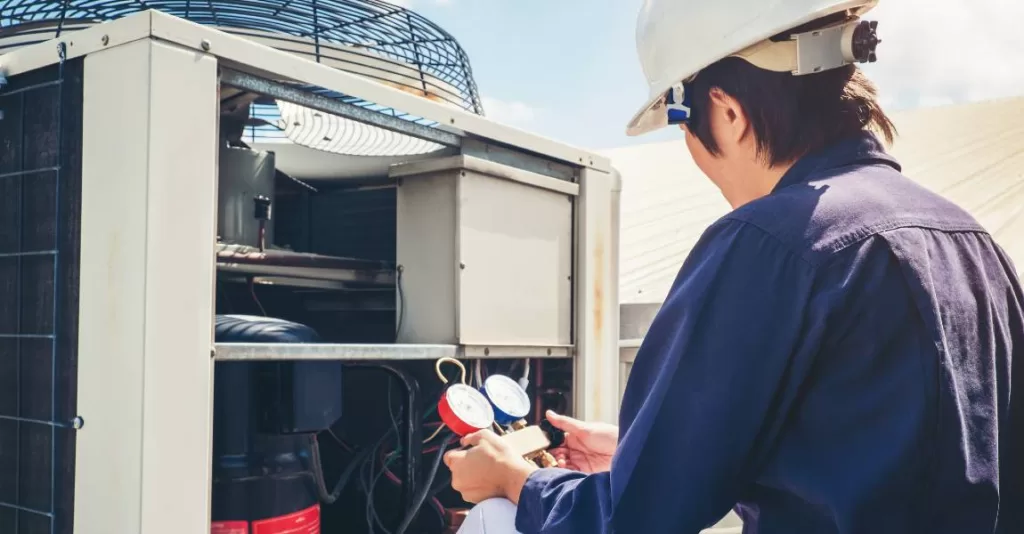
- What Affects HVAC Inspection Costs?
- What are Some Additional Costs and Considerations?
- What are the Different Types of HVAC Inspections?
- Why is it Important to Maintain Your HVAC Equipment?
- Air Conditioning Maintenance
- Estimating HVAC Replacement Cost
- FAQs
- Some Essential Questions to Ask the HVAC Contractor
- Final Thoughts
What Affects HVAC Inspection Costs?
The cost of an HVAC or furnace inspection can be affected by various factors, including the system’s size and complexity, the property’s location, and the level of expertise required. Other factors that can impact the cost include the age and condition of the HVAC system, any additional services or unexpected repair services needed, and the reputation and experience of the qualified technician or company.
- Size and complexity of the HVAC system
- Type of Unit Type
- Geographic Location
- Age and condition of the HVAC system
- Additional services or repairs needed
- Reputation and experience of the HVAC technician or company
- Labor Costs
- Season
What are Some Additional Costs and Considerations?
Some additional costs and considerations of HVAC inspection costs include:
- Annual maintenance plan: Some HVAC companies offer annual maintenance plans that include regular inspections as part of the package. These plans may require an upfront payment or monthly fees, but they can help save money in the long run by ensuring the system is well-maintained and catching any potential issues early on.
- Annual inspections: Even without a preventive maintenance plan, scheduling annual inspections is recommended to keep the HVAC system running efficiently and prevent costly repairs. These inspections may come at an additional cost, but they can help identify issues or inefficiencies before they become major problems.
- Travel fees: Depending on the HVAC company’s location and the distance they need to travel to reach your property, travel fees may be involved. These fees can vary depending on the distance and add to the inspection’s overall cost.
- Repairs and replacements: During an HVAC inspection, if any repairs or replacements are needed, these will come with additional costs. It’s important to budget for these potential expenses as they can vary depending on the extent of the repairs needed and the cost of replacement parts.
- HVAC system age and condition: Older or poor HVAC systems may require additional inspections and maintenance visits, increasing the overall cost. It’s important to consider the age and condition of the complex system when budgeting for HVAC inspection costs.
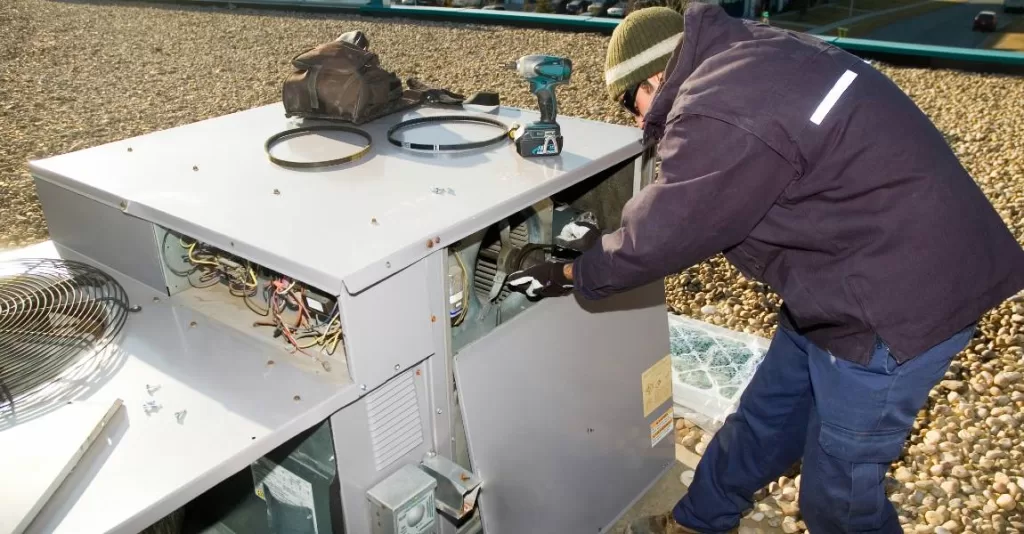
What are the Different Types of HVAC Inspections?
When it comes to HVAC systems, regular inspections are crucial to ensure their efficiency and longevity. But did you know that there are different types of HVAC inspections? Understanding these inspections can help you make informed decisions about your system’s maintenance package and repair needs.
Not all HVAC inspections are the same. Depending on your needs, different inspections address specific aspects of your HVAC system. By understanding these different types, you can ensure your system is thoroughly checked and maintained, saving you from costly repairs and ensuring optimal performance.
Roof Vent Inspection
A roof vent is a ventilation system installed on the roof of a building to allow air to circulate and prevent moisture buildup. During an inspection, the following points are checked:
- Ensure proper installation and functioning of the roof vent.
- Check for any damage or blockages that may hinder ventilation.
How Much Does a Roof Vent Inspection Cost?
The cost of a roof vent inspection can vary depending on factors such as the location, the system’s size, and the inspection’s complexity. On average, homeowners can expect to pay anywhere from $100 to $300 for a professional HVAC roof vent inspection.
Air Duct Inspection
Air ducts are pathways that distribute heated or cooled air throughout a building. During an inspection, the following points are checked:
- Inspect for any leaks or damage in the air ducts that may result in energy loss.
- Check for proper insulation and cleanliness of the ducts to maintain indoor air quality.
What’s the Average Price for an Air Duct Inspection?
The average price for an air duct inspection can vary depending on factors such as the size of the home, the location, and the specific services included. However, on average, homeowners can expect to pay anywhere from $250 to $500 for a professional air duct inspection.
Furnace Inspection
A furnace is a heating system that generates and distributes warm air throughout a building. During an inspection, the following points are checked:
- Inspect the furnace for wear and tear or malfunctioning components.
- Check the furnace’s efficiency and ensure proper ventilation for safe operation.
What’s the Average Cost for a Furnace Inspection?
The average cost for a furnace inspection can vary depending on factors such as location, the size of the furnace, furnace components, and any additional services included.
The average cost for a basic furnace inspection by homeowners typically ranges from $80 to $150.
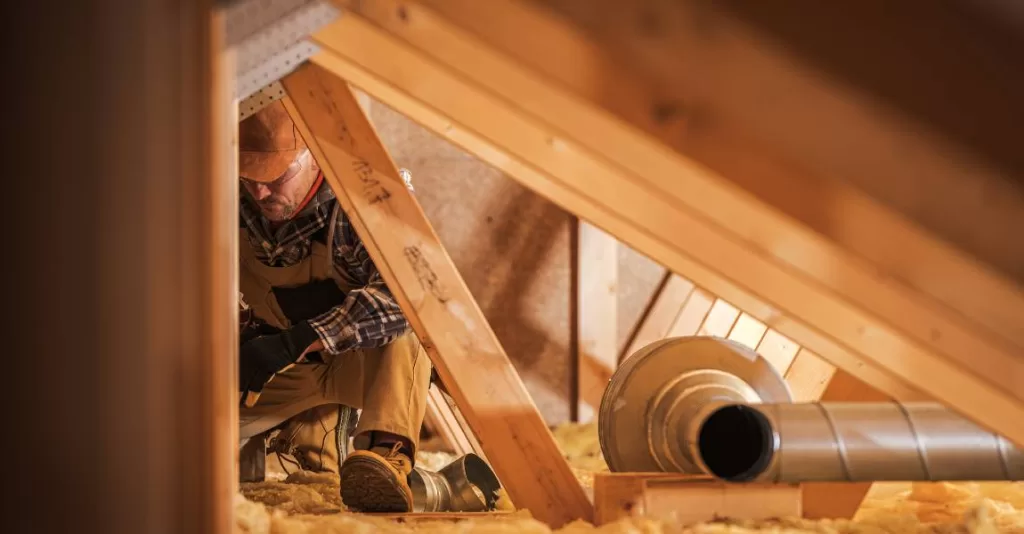
Attic Fan Inspection
An attic fan is a ventilation system installed in the attic to regulate temperature and moisture levels. During an inspection, the following points are checked:
- Check the fan’s motor and blades for any signs of damage or malfunction.
- Ensure proper ventilation and assess if the fan is effectively controlling temperature and moisture in the attic.
How Much is the Average Cost for Inspection of an Attic Fan?
The average cost for an attic fan inspection can vary depending on factors such as location, the size of the attic, and the complexity of the inspection. However, on average, homeowners can expect to pay around $100 to $200 for an attic fan inspection.
Radiant Flooring Inspection
Radiant flooring is a heating system installed beneath the floor to provide warmth. During an inspection, the following points are checked:
- Radiant flooring Inspection checks the heating elements and ensures they are functioning properly.
- Check for leaks or damage in the pipes or tubes that distribute the heat.
What’s the Price Range for a Radiant Flooring Inspection?
The price range for a radiant flooring inspection can vary depending on factors such as the size of the space, the complexity of the system, and the location of the property. On average, homeowners can expect to pay anywhere from $200 to $500 for a professional radiant flooring inspection.
AC System Inspection
An AC System Inspection is a cooling system that removes heat from the air and circulates cool air throughout a building. During an inspection, the following points are checked:
- Inspect the air conditioning system for any signs of wear and tear or malfunctioning components.
- Check the efficiency of the air conditioner and ensure proper ventilation for optimal cooling.
What’s the Average Inspection Price Range for AC System Inspection?
The average inspection price range for AC system inspection can vary depending on factors such as location, size of the system, and the specific services included. However, AC system inspections typically range from $75 to $200.
Boiler Inspection
A boiler is a heating system that uses water or steam to distribute heat throughout a building. During an inspection, the following points are checked:
- Inspect the boiler for any leaks, corrosion, or malfunctioning parts.
- Check the boiler’s efficiency and ensure proper ventilation for safe operation.
What’s the Cost Range for a Boiler Inspection?
The cost range for a boiler inspection can vary depending on factors such as the size and type of boiler, location, and the specific services included in the inspection.
A boiler inspection for homeowners typically ranges from $100 to $300.
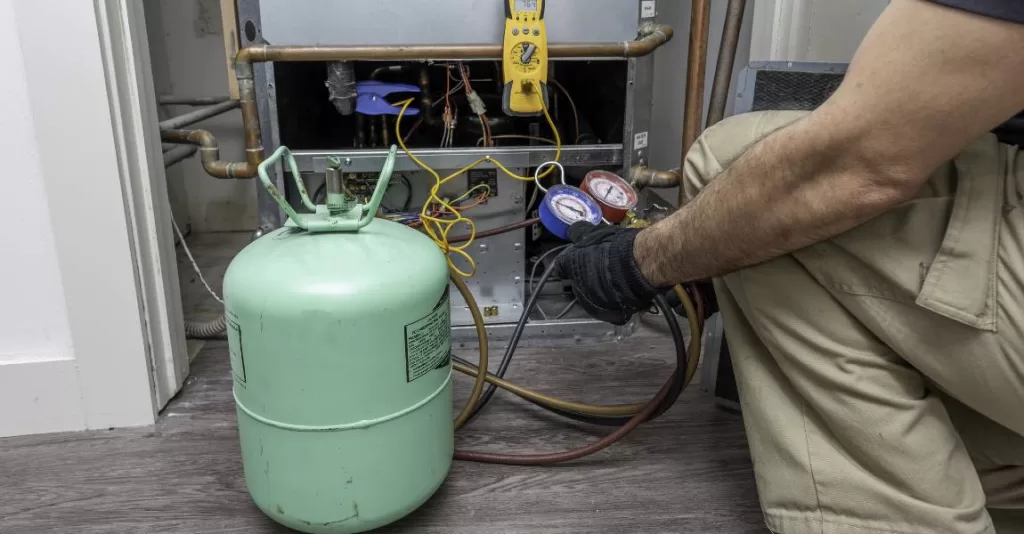
Pump Inspection
HVAC pump inspection is crucial for ensuring the proper functioning and Energy Efficiency of the HVAC unit. A comprehensive inspection can help optimize the system’s energy efficiency and lower utility bills. Professional inspection helps identify any potential issues or malfunctions in the pump, allowing for timely repairs or replacements, thus preventing costly breakdowns and downtime.
- During a pump inspection, licensed technicians check for leaks, abnormal noises, and vibrations and inspect the pump’s electrical connections and controls. They also evaluate the pump’s performance and efficiency, ensuring it operates within the specified parameters. Additionally, they may clean or replace filters, lubricate moving parts, and check the pump’s overall condition to ensure optimal performance and longevity.
- Preventative Maintenance-Regular inspections of HVAC pumps allow for the early detection of potential issues or malfunctions. This proactive approach to maintenance can also extend the lifespan of the pump and other components of the HVAC system, saving businesses and homeowners money in the long run.
What is the Cost of a Pump Inspection?
The average cost of an HVAC pump inspection can vary depending on factors such as the location, the size of the pump, and the specific services included in the routine inspection. However, the average cost can range from $100 to $300.
Why is it Important to Maintain Your HVAC Equipment?
Maintaining your HVAC equipment to ensure optimal performance and longevity is important. Regular maintenance and HVAC tune-ups help prevent issues such as refrigerant leaks, dirty condenser coils, malfunctioning electrical components, clogged condensate drains, and faulty heat pumps or heat exchangers, leading to expensive repairs or potential replacements and inefficient heating or cooling.
Cost of Replacing Refrigerant
The average cost of replacing refrigerant if refrigerant levels are low can range from $150 to $450, depending on the type of refrigerant and the cost of labor involved.
Electrical Components and Repair Costs
HVAC electrical components refer to the electrical parts and systems within heating, ventilation, and air conditioning units, which are crucial for their proper functioning. The average price for HVAC electrical component repairs can vary depending on the specific issue and the system’s complexity, but it typically ranges from $150 to $500.
Evaporator Coil Maintenance
The cost of evaporator coil maintenance and annual tune-ups can vary depending on factors such as the size and type of the coil, dirty coils, the extent of cleaning or repairs needed, and whether hiring an HVAC professional service or done DIY.
However, regular maintenance is crucial to ensure the efficient and proper functioning of the coil, prevent potential breakdowns, and potentially save on costly repairs or replacements in the long run.
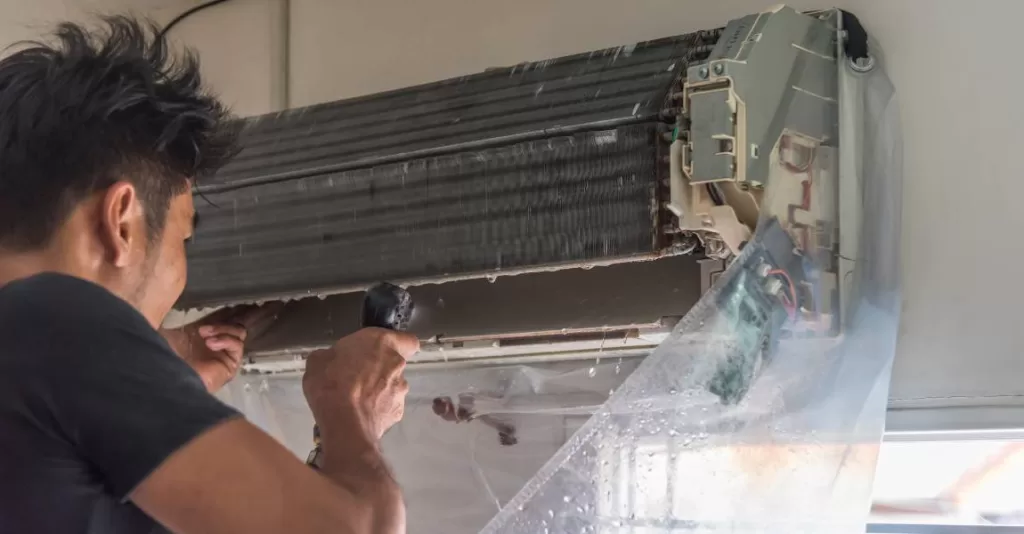
Air Conditioning Maintenance
Air Conditioning Maintenance refers to the regular upkeep and servicing of an AC system, including AC tune-ups and air filter maintenance, to ensure optimal performance and efficiency.
This includes activities like cleaning or replacing dirty filters and conducting annual AC tune-ups to prevent breakdowns and extend the unit’s lifespan.
Air Conditioning Maintenance Cost
The average cost of air conditioning maintenance can vary depending on various factors such as the location, the size and type of the AC unit, and the extent of the maintenance required.
On average, homeowners can expect to pay between $100 to $300 for a routine AC maintenance service. This typically includes cleaning and inspecting the AC unit, checking refrigerant levels, lubricating moving parts air filter replacement, and ensuring proper airflow.
However, the cost can increase significantly if more extensive repairs or replacements are needed. For example, if there are issues with the compressor or condenser coils or if the refrigerant needs refilled, the cost can range from $200 to $1,500 or more.
Estimating HVAC Replacement Cost
Estimating HVAC replacement cost refers to determining the expenses associated with replacing a heating, ventilation, and air conditioning (HVAC) system in a building or property.
This estimation considers various factors such as the HVAC system’s type and size, the installation’s complexity, the materials and equipment required, and any additional costs such as labor and permits. Property owners and contractors can budget and plan accordingly by accurately estimating the HVAC potential replacement cost, ensuring that they have the necessary funds and resources to complete the replacement project successfully.
Additionally, estimating HVAC replacement cost allows for comparison and evaluation of different options, helping individuals make informed decisions about the most suitable and cost-effective HVAC system for their specific needs.
FAQs
What is the recommended frequency for HVAC system check-ups?
It is recommended to have your HVAC system checked at least once a year, ideally before the heating or cooling season starts. However, some manufacturers and HVAC professionals may advise more frequent checks depending on the system’s age, usage, and specific requirements.
Can I save money by skipping regular HVAC system checks?
While it may seem like a cost-saving measure in the short term, skipping regular HVAC system checks can lead to inefficient operation, higher energy bills, and potential breakdowns. Investing in regular maintenance can help you save money in the long run by preventing major repairs or premature system replacements.
How can I find a reliable HVAC contractor?
To find a reliable HVAC contractor, consider asking for recommendations from friends, family, or neighbors who have had positive experiences. Verify their licenses, certifications, and insurance coverage. Requesting and comparing quotes from multiple contractors to ensure fair pricing is also beneficial.
Some Essential Questions to Ask the HVAC Contractor
- What specific services are included in the HVAC system check?
- Are there any additional costs I should be aware of?
- Can you provide references or customer testimonials?
- Are you a licensed professional, insured, and certified?
- How many years of experience do you have?
- Do you offer any extended warranties or guarantees on your work?
- What is your availability for scheduling the HVAC system check?
- Can I perform HVAC system checks myself to save money?
- Are there any financing options available for HVAC system checks?
- Do you provide a complete inspection and inspection report?
- Will My HVAC Warranty Be Voided if I Don’t Do an Annual Tune-up?
Final Thoughts
In conclusion, checking your HVAC system is essential for maintaining efficiency and longevity. While the cost may vary depending on factors such as the size of your system and any necessary repairs, the benefits of regular maintenance far outweigh the expense.
Don’t wait until your HVAC system breaks down; schedule a professional check-up today to ensure optimal performance and avoid costly repairs in the future. Contact our HVAC experts now to schedule your appointment and enjoy a comfortable, energy-efficient home.





